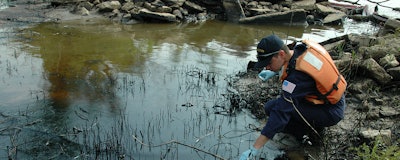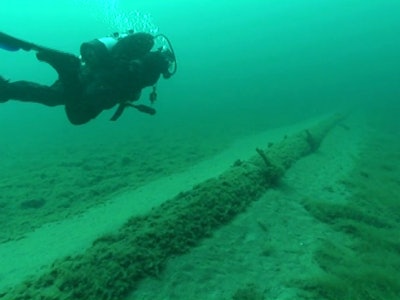
Experts predict that a worst-case scenario leak of an old oil pipeline where Lake Michigan and Lake Huron meet would cost nearly $2 billion.
The state of Michigan released a draft of a report by an independent team of scientists who estimate that more than half the cost would be cleanup as well as lost tourism income.
The scientists were evaluating the potential impact of a spill from Canadian company Enbridge's Line 5, which runs beneath the Straits of Mackinac.
Enbridge’s pipelines, which run about 1,000 feet apart at depths ranging from 100-270 feet, have laid on the bottom of the Straits for more than six decades. Today, much of the oil flowing through the Line 5 pipelines (90 to 95% of it) is coming from Canada and taking a shortcut through Michigan and the Straits of Mackinac before crossing back into Canada near Port Huron.
The pipeline has transported crude oil through the Straits of Mackinac without incident until now, but a number of troubling factors are coming together that cause grave concern:
- A recent increase in the volume and pressure of fluids moving through the pipelines
- The tarnished safety record of Enbridge, Inc., the Canadian company that operates the pipeline
- Newly discovered issues of compliance with the contract between the pipeline company and the State of Michigan, including 8 known violations
- The age, location, and questionable condition of the pipeline
- The lack of transparency about safety inspections and what petroleum products are being transported through Line 5 in the Great Lakes
- The lack of a proactive regulatory environment in Michigan and at the federal level
Enbridge says the pipeline is in good shape and that the report's scenarios are "purely hypothetical." But critics say the 65-year-old line is vulnerable to leaks and should be shut down.
Michigan natural resources director Keith Creagh (CREE) says Line 5 can't remain in its current form.
 A diver working on behalf of the nonprofit National Wildlife Federation inspects the Line 5 oil pipelines at the lake bottom in the Straits of Mackinac during a July 2013 dive. (National Wildlife Federation)
A diver working on behalf of the nonprofit National Wildlife Federation inspects the Line 5 oil pipelines at the lake bottom in the Straits of Mackinac during a July 2013 dive. (National Wildlife Federation)(Source: Associated Press)






















